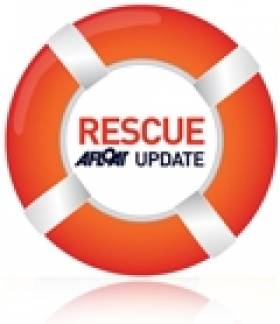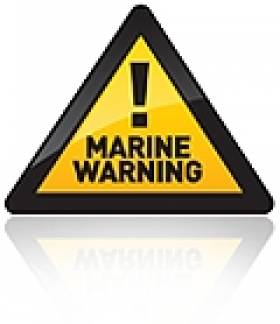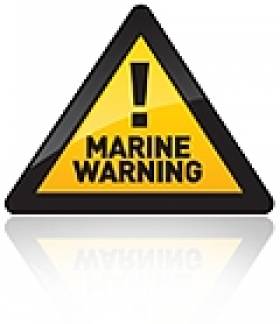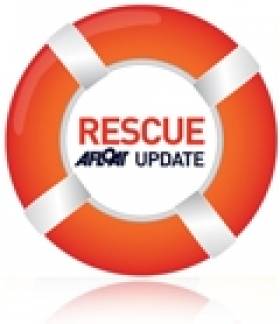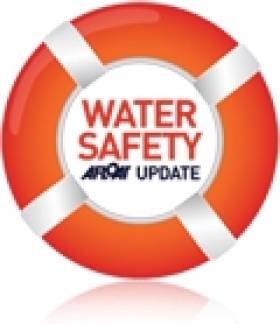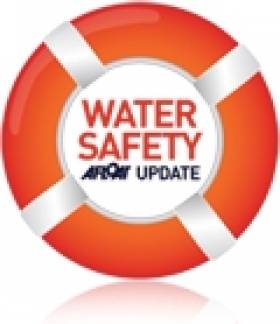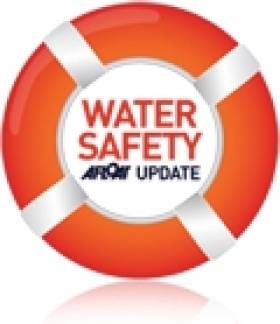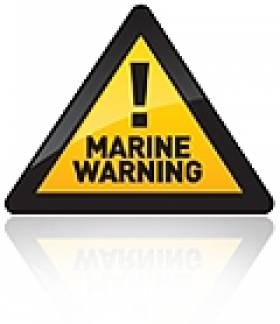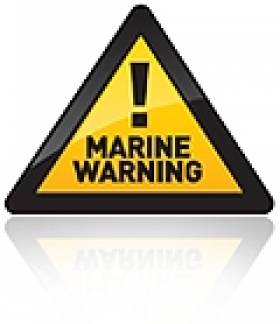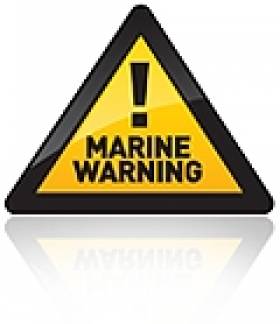Displaying items by tag: Irish Water Safety
Clare Lifeguards Set New Records at Lifesaving Championships
#lifeguards – Lifesaving teams from 17 counties competed on Sat 15th Feb 2014 in Irish Water Safety's National Irish Pool Lifesaving Championships. An action-filled day of events saw 240 of Ireland's fittest Lifesavers compete at the University of Limerick's 50-metre pool complex. This year over 100 teams entered from 17 counties around the country - both Ireland and Northern Ireland. Fifteen Irish National Records were broken; 11 new records from Junior age category (13-16) and 4 in Senarios (16+).
"This Annual competition gives the best Lifesavers in Ireland an opportunity to compete in conditions that Lifesavers can encounter in real-life rescue situations. The sport of lifesaving teaches participants the skills necessary to rescue people in distress in water," said Chairman of Irish Water Safety, Breda Collins.
"Many of the competitors, having worked as Lifeguards in pools nationwide, got their chance to pitch their skills against the finest lifesavers in the country," added Collins. "The events are varied and challenging with competitors swimming under immersed obstacles, rescuing "casualties" from the water and skillfully testing a variety of lifesaving skills in the process."
The National Championships are part of Irish Water Safety's (IWS) extensive programme to promote water safety in Ireland with a particular focus on the necessary skills required by pool Lifeguards nationwide. The Championships encourage people to enrol in one of IWS's many courses nationwide in the valuable skills of swimming, rescue and lifesaving. The event promotes the fitness and readiness for action of the lifesavers and demonstrates Lifeguard water rescues to the public.
RESULTS:
Junior Boys: 1st Clare A; 2nd Wexford A; 3rd Sligo.
Junior Girls: 1st Clare A; 2nd Wexford A; 3rd Wicklow.
Senior Men: 1st Clare A; 2nd Waterford A; 3rd Sligo A.
Senior Ladies: 1st Clare A; 2nd Donegal A; 3rd Waterford.
Masters Men: 1st Sligo; 2nd Clare; 3rd Cork.
Masters Ladies: 1st Clare; 2nd Cork;3rd Wicklow.
NEW IRISH RECORDS (description of events below):
100m Manikin Tow with Fins (Boys) Rory McEvoy Clare 1.02.14
100m Manikin Tow with Fins (Girls) Lily Barrett Clare 1.10.47
200m Super Lifesaver (Girls) Lily Barrett Clare 2.44.80
100m Manikin Carry with Fins (Boys) Joseph Mooney Sligo 51.82
100m Manikin Carry with fins (Girls) Georgina Steele Wexford A 1.04.40
50m Manikin Carry (Womens) Lauren Hughes Union (Belfast) 43.18
50m Manikin Carry (Boys) Joseph Mooney Sligo 32.16
50m Manikin Carry (Girls) Georgina Steele Wexford A 40.47
4x25m Manikin Relay (Boys) Clare A 1.24.88
4x25m Manikin Relay (Girls) Clare A 1.31.73
4x25m Manikin Relay (Mens) Clare A 1.24.31
4x50m Medley Relay (Boys) Clare A 1.50.59
4x50m Medley Relay (Girls) Clare A 1.59.34
4x50m Medley Relay (Mens) Clare A 1.46.08
Line Throw (Womens) Wexford 13.13
Irish Water Safety Warns Public to Stay Away From Edge of Waterways
#watersafety – Irish Water Safety is warning the public that to stay SAFE they must stay away from the edges of waterways during storm conditions that are even more dangerous due to heavy rain, strong gale force winds and high tides.
Fast rising flood water is very powerful and often hides the dangers of exposed drains, exposed manhole covers and submerged objects. No driver or pedestrian should take a chance passing through flooded roadways. Parents should caution children that small flooded streams are very fast and that floodwater hides true water depths.
What should I do when I hear a Flood Warning?
1. Listen to the national and local radio for met eireann updates. Click on
http://www.flooding.ie/en/ for further information.
2. Check on neighbours particularly if they are elderly, infirmed or families with young children.
3. Move your vehicles to higher ground.
4. Move animal stock to higher ground.
5. Check your small craft to ensure they are well secured or moored, consider taking them up on a
trailer for safety.
6. Make sure you have warm clothes, food, drink, a torch and radio.
7. Block doorways and airbricks with sandbags or plastic bags filled with earth. Floodgate products
will work effectively also.
8. Switch off gas and electricity supplies if flooding is imminent.
9. Check the time of High Water in the Newspaper or at www.irishtides.ie
Personal Safety
1. Avoid flood waters at all times.
2. Carry a mobile phone at all times in case you need to call for help - call 112 in emergency.
3. Wear suitable protective clothing & a Lifejacket in on or around water.
4. Never try to swim through fast flowing water.
5. Never put your feet down if swept away.
6. Flooding on roads will be deeper at dips and around bridges.
7. Stay away from sea and flood defences.
8. When walking or driving, be aware of manhole covers and gratings that may have been moved
due to the heavy flow of water.
9. Take care when using electric appliances in damp or flood conditions.
10. Remember that during the hours of darkness the dangers are multiplied.
Storm Warning: Water Safety Says 'Stay Away from the Edge'
#marinesafety – Irish Water Safety is warning the public that to stay safe they must stay away from the edges of waterways during storm conditions that are even more dangerous due to heavy rain, strong gale force winds and high tides.
Fast rising flood water is very powerful and often hides the dangers of exposed drains, exposed manhole covers and submerged objects. No driver or pedestrian should take a chance passing through flooded roadways. Parents should caution children that small flooded streams are very fast and that floodwater hides true water depths.
What should I do when I hear a Flood Warning?
1. Listen to the national and local radio for met eireann updates. Click on
http://www.flooding.ie/en/ for further information.
2. Check on neighbours particularly if they are elderly, infirmed or families with young children.
3. Move your vehicles to higher ground.
4. Move animal stock to higher ground.
5. Check your small craft to ensure they are well secured or moored, consider taking them up on a
trailer for safety.
6. Make sure you have warm clothes, food, drink, a torch and radio.
7. Block doorways and airbricks with sandbags or plastic bags filled with earth. Floodgate products
will work effectively also.
8. Switch off gas and electricity supplies if flooding is imminent.
9. Check the time of High Water in the Newspaper or at www.irishtides.ie
Personal Safety
1. Avoid flood waters at all times.
2. Carry a mobile phone at all times in case you need to call for help - call 112 in emergency.
3. Wear suitable protective clothing & a Lifejacket in on or around water.
4. Never try to swim through fast flowing water.
5. Never put your feet down if swept away.
6. Flooding on roads will be deeper at dips and around bridges.
7. Stay away from sea and flood defences.
8. When walking or driving, be aware of manhole covers and gratings that may have been moved
due to the heavy flow of water.
9. Take care when using electric appliances in damp or flood conditions.
10. Remember that during the hours of darkness the dangers are multiplied.
Clare Lifesavers Top in National Surf Lifesaving Champs
#lifesaving – Competitors at the National Surf Lifesaving Championships had their skills and stamina tested in events that simulated emergency rescue scenarios in glorious sunshine and in an azure blue sea at Curracloe beach. The winning team from Clare dominated the competition with the fittest lifesavers nationwide at this annual gala of lifesaving. Ireland's best lifesavers were challenged in open water conditions off the Wexford coast to rescue simulated "casualties" in testing run, swim, board rescue, surf ski races and ocean man events. However the dominance of Clare came through with exceptional results with three Clare teams in the first four teams.
The President's Trophy (Prize for winning County Team was presented by President Séan O'Kelly in 1950):
1st: Clare Men
2nd: Donegal Ladies
3rd : Clare Ladies
4th : Clare Men B Team
5th : Waterford Men
6th : Galway Men
Irish Water Safety Chief Executive, John Leech said these are the lifeguards who saved 559 members of the public during the heat wave in July. This is hardly surprising as we have 7 European medalist's competing on these teams. These athletes demonstrated great competence and professionalism today and made for a stunning spectacle on a sun drenched Curracloe Beach. It is a credit to Irish Water Safety coaches nationwide who spent all year preparing competitors around Ireland's coastline. Ireland won 10 Junior and senior European medals in Holland and Italy during the summer.
The Sport of Lifesaving offers lifesaving skills and the development of a healthy lifestyle. As part of its remit to promote water safety in Ireland, Irish Water Safety trains Lifeguards employed at beaches, lakes, rivers and pools nationwide. Irish Water Safety encourages the public to learn to swim and enroll in one of the many courses nationwide in the valuable skills of water survival and lifesaving.
Four More Drownings Bring Renewed Water Safety Appeal
#WaterSafety - Four more people have drowned in separate incidents around Ireland as the heatwave continues.
As RTÉ News reports, a 24-year-old man died while swimming in the sea near Ardara in Co Donegal yesterday afternoon (20 July).
Later, the body of a second victim was recovered from the Shrule River in Newtownstewart, Co Tyrone after getting into difficulty.
A third man in his 60s is was drowned after failing to return from a swim in a quarry near Carrick-on-Suir. His body was recovered earlier today.
The tragedies follow news of a 19-year-old who drowned while swimming with friends in Lough Leane in Killarney on Friday evening (19 July).
And a woman in her 30s was lucky to be rescued after getting into difficulty swimming in the River Nore near Kilkenny. She is currently in a serious but stable condition in hospital.
Irish Water Safety have renewed their appeal for the public to take extra care when taking to the water during this extraordinary hot weather that had already claimed seven lives as of Thursday last.
Derry Drowning Brings Heatwave Water Death Toll To Seven
#WaterSafety - Water safety chiefs have yet again underscored the dangers of swimming in unsupervised areas after a teenager drowned in Co Derry yesterday afternoon.
The Irish Times reports that the 15-year-old boy was airlifted to hospital by police helicopter after getting into difficulty when he fell into the River Roe.
The as yet unnamed teen is the seventh drowning victim on the island of Ireland during the current heatwave.
Last week alone saw five drownings of young people, prompting Irish Water Safety CEO John Leech to make a public appeal for awareness of the dangers of swimming in areas without lifeguards, especially in open water.
“One of the reasons we’re losing all these youngish people is because a whole generation haven’t learned to swim in open water,” said Leech, who added that 32 per cent of victims have consumed alcohol.
The Irish Times has more on the story HERE.
Roscommon Drowning Marks Fourth Tragedy In Two Days
#WaterSafety - RTÉ News reports that a teenager has drowned in Co Roscommon in the fourth such tragic incident during this week's heatwave.
The teen was one of three swimmers who went missing in Annaghmore Lough near Strokestown yesterday evening.
Two of the swimmers managed to reach the shore, but the body of this third was recovered before midnight by a search party led by the Irish Coast Guard's Shannon rescue helicopter and involving local angling boats.
The sad news comes just a day after a 12-year-old boy drowned while swimming in the sea off Youghal beach in Co Cork.
That followed the death of a 21-year-old woman named Lisa Knight who was swimming with friends in the River Feale in Co Limerick late on Tuesday night.
And on Wednesday afternoon a 17-year-old boy drowned after getting into difficulty swimming in a lake in Celbridge, Co Kildare, according to The Irish Times.
Irish Water Safety chief John Leech has appealed to the public on RTÉ Radio 1's Morning Ireland to be aware of the risks associated with the water, especially in unsupervised areas - and particularly for inexperienced swimmers.
Drownings Double in Last Two Years - Irish Water Safety
Irish Water Safety (IWS) held a Council meeting today and discussed the latest drowning statistics 'AS A MATTER OF URGENCY' for 2012 which will be released shortly.
147 people drowned last year compared to 162 people who were killed on our roads in crashes.
What was most alarming is that 33 people drowned accidentally in 2010 whilst last year 66 people drowned accidentally. These figures are alarming and IWS are pleading with the public to ensure that they always wear a lifejacket when they are on or near water.
Most accidental drownings are preventable so long as people wear lifejackets as our Coast Guard can deploy rescue assets such as lifeboats and helicopters to a casualty, very often in minutes from when they are alerted.
The Council of IWS is concerned that the media and public are not taking heade to our messages and request that they assist us in promulgating the message out to the public as there is an alarming increase in drownings in the last two years.
Whilst drowning figures had reduced greatly from an average of 180 ten years ago to 140 last year this trend is now heading in a very worrying direction. With a long summer ahead and a promise of further good weather, IWS pleads with the public when they are on or near the water to "ALWAYS WEAR A LIFEJACKET" AS "LIFEJACKETS FLOAT - YOU DON'T".
Inflatable Lifejacket Checklist
Ensure your automatic inflatable lifejacket is serviced by an approved agent every year and is in date
Ensure Cartridges have not been punctured and are secured firmly.
Ensure all zips, buckles, fasteners and webbing straps are functioning correctly and adjusted to fit the user.
Check that fitted lights are operating correctly.
Check that the valve or lifejacket is not leaking.
Ensure that you lifejacket is fitted with a crotch strap and is fitted correctly.
Always ensure it is serviceable condition with all zips, ties and velcros operating correctly
Irish Water Safety Warn of Bank Holiday Drowning Risks
There are 140 drownings in Ireland every year - that's more than five per fortnight. As we approach the May Bank Holiday weekend, water safety should be prioritised by anyone coming close to coastline or inland waterways and when pursuing water-based or waterside activities to avoid the dangers of cold shock, hypothermia and drowning.
There are many reasons people drown yet on Bank Holiday weekends, people often become complacent and put themselves and their families in situations that result in injury or loss of life.
People have a responsibility to themselves and family to stay safe around water by knowing the dangers and learning from the situations that have led to tragic drownings in the past:
Always wear a Lifejacket when on water and ensure that it has a correctly fitted crotch strap.
Shore walkers should stay away from the edge and beach walkers should remain vigilant to the dangers of being stranded.
Ensure that you are fully trained and competent for your aquatic activity.
Be mindful of the safety of family and friends, especially children. Children are naturally curious about water and constant supervision is the safest way to avoid tragedy. Parents of primary school children should check if their local school has yet introduced Irish Water Safety's PAWS programme - Primary Aquatics Water Safety, which teaches children all about staying safe around water. The program is now a component part of the physical education strand of the primary school curriculum and is key to reducing child drowning mortalities and injuries. Now is the time to instill good habits in time for the summer months ahead.
Anglers should be extremely vigilant when fishing from the shoreline of Atlantic swells.
Swimmers should swim parallel and close to the shore.
Alcohol should be avoided before or during any aquatic activity. On average, a third of drowning victims had consumed alcohol therefore it is best left until after your activity to celebrate.
In emergency situations, never hesitate to call 112.
#watersafety – On average three people drown every week in Ireland and with St. Patrick's Day 2013 festivities approaching, Irish Water Safety is appealing to all members of the public to ensure that they wear a well maintained and correctly fitting lifejacket for all water-based activities.
IWS also appeals for an awareness of the potential danger of excessive alcohol consumption in or about the vicinity of water as on average a third of all drowning victims will have consumed alcohol.
There is an increased risk of water related accidents and tragedies this coming long-weekend as the number of people taking to activities in and around water will increase. Drowning is often as a result of excessive alcohol consumption(ii) this level will only decrease when the public takes responsibility to protect themselves, family and friends from the dangers around waterways, these are tragic and preventable deaths.
This weekend may entice people to enjoy recreational boating, sailing, angling, surfing, diving, walks and general recreation by waterways nationwide. Water temperatures are still cold at 7 to 11 degrees Celsius at sea and cooler in freshwater. People are at risk to cold shock and hypothermia due to sudden immersion or prolonged periods in water.
Whilst the forecast is for cold weather over the weekend, many people will still take to our waterways so it will be crucial and perhaps lifesaving that a lifejacket, with a crotch strap, be worn. It is also critical that adults supervise children at all times around water.
Information on how to ensure that you have a correct lifejacket that is fit-for-purpose is available at Irish Water Safety's website, www.iws.ie.


























